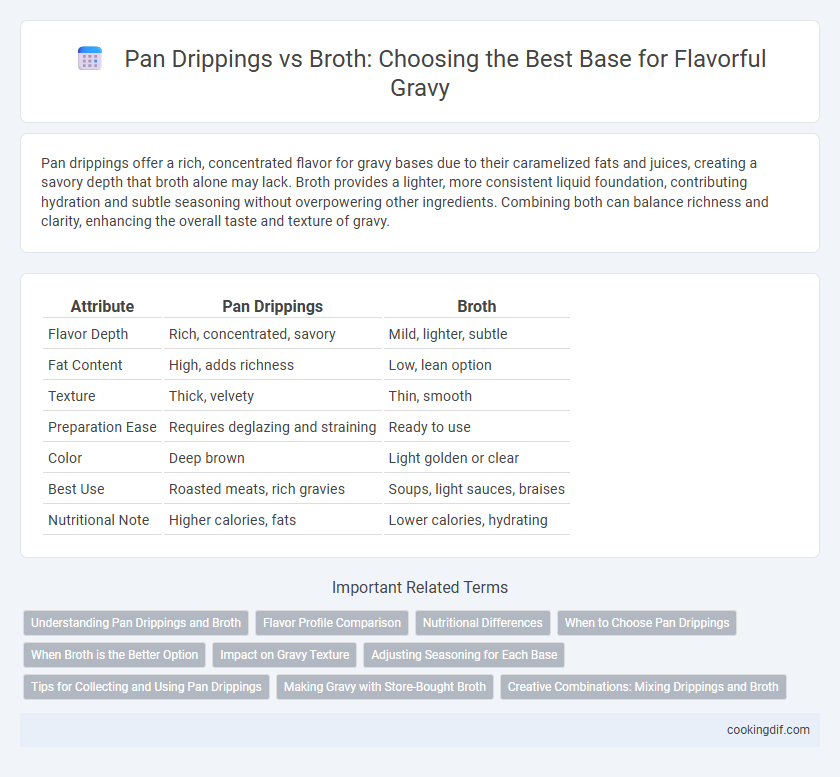Pan drippings offer a rich, concentrated flavor for gravy bases due to their caramelized fats and juices, creating a savory depth that broth alone may lack. Broth provides a lighter, more consistent liquid foundation, contributing hydration and subtle seasoning without overpowering other ingredients. Combining both can balance richness and clarity, enhancing the overall taste and texture of gravy.
Table of Comparison
| Attribute | Pan Drippings | Broth |
|---|---|---|
| Flavor Depth | Rich, concentrated, savory | Mild, lighter, subtle |
| Fat Content | High, adds richness | Low, lean option |
| Texture | Thick, velvety | Thin, smooth |
| Preparation Ease | Requires deglazing and straining | Ready to use |
| Color | Deep brown | Light golden or clear |
| Best Use | Roasted meats, rich gravies | Soups, light sauces, braises |
| Nutritional Note | Higher calories, fats | Lower calories, hydrating |
Understanding Pan Drippings and Broth
Pan drippings contain concentrated flavors and caramelized bits from cooked meat, creating a rich, savory base for gravy. Broth offers a lighter, more neutral liquid often used to balance or extend the intensity of pan drippings. Understanding the distinct taste profiles and textures of pan drippings versus broth helps achieve the desired depth and consistency in gravy recipes.
Flavor Profile Comparison
Pan drippings provide a rich, concentrated flavor with deep, caramelized notes and a natural umami boost, creating a robust and savory gravy base. Broth offers a lighter, more delicate taste, with a subtle savory essence that allows other ingredients to shine without overpowering the dish. Using pan drippings results in a more intense, flavorful gravy, while broth yields a smoother, milder profile ideal for complementing a variety of meals.
Nutritional Differences
Pan drippings contain concentrated fats and proteins from roasted meats, providing richer flavor and higher calorie content compared to broth, which is typically lower in fat and calories. Broth, especially when homemade from bones and vegetables, offers essential nutrients like collagen, minerals, and vitamins with minimal fat, making it a lighter base option for gravy. Choosing pan drippings can increase sodium and saturated fat intake, whereas broth provides a more balanced and nutrient-dense foundation for healthier gravy recipes.
When to Choose Pan Drippings
Pan drippings provide a rich, concentrated flavor ideal for gravies served with roasted meats, capturing the caramelized essence of the browned bits left in the pan. Use pan drippings when you want a deeply savory, robust base that enhances the overall depth and complexity of the gravy. This option is perfect for dishes like roast chicken, turkey, or beef where the drippings complement the natural juices and aromas of the meat.
When Broth is the Better Option
Broth is the better option for gravy base when pan drippings are scarce or overly concentrated, providing a balanced flavor and smoother texture. Using broth enhances moisture and adds natural umami, which helps create a rich, well-rounded gravy without the risk of bitterness. High-quality chicken, beef, or vegetable broth ensures consistent seasoning and prevents the gravy from becoming too salty or greasy.
Impact on Gravy Texture
Pan drippings create a richer, thicker gravy texture due to their concentrated fat and caramelized meat particles, which provide depth and velvety consistency. Broth results in a lighter, more fluid gravy with a cleaner flavor but lacks the intense mouthfeel and body that pan drippings offer. Combining pan drippings with broth can balance richness and volume, enhancing the overall texture of the gravy.
Adjusting Seasoning for Each Base
Pan drippings provide a rich, robust flavor with natural fats that enhance the depth of gravy, requiring less added seasoning compared to broth, which tends to be lighter and more neutral. When using broth as a base, increasing salt, pepper, and herbs like thyme or rosemary helps build complexity that mimics the savory intensity of pan drippings. Adjust seasoning gradually to balance the gravy's flavor profile, ensuring the base's characteristics are complemented rather than overpowered.
Tips for Collecting and Using Pan Drippings
Pan drippings, rich in caramelized flavors and fats, create a more robust and savory gravy base compared to broth, which offers a lighter, sometimes less intense taste. To maximize flavor, collect pan drippings immediately after roasting by deglazing the pan with warm broth or wine, scraping up browned bits to incorporate essential umami elements. Strain the drippings to remove excess fat before simmering with stock, flour, or cornstarch to achieve the desired gravy consistency and depth.
Making Gravy with Store-Bought Broth
Using store-bought broth as a base for gravy offers a consistent and convenient option compared to pan drippings, which vary in flavor intensity and fat content. Store-bought broths, available in chicken, beef, and vegetable varieties, enhance the gravy's depth with balanced seasoning and a controlled salt level. Incorporating broth requires simmering to concentrate flavors and achieve the desired thickness, often with a roux or slurry, resulting in a smooth, flavorful gravy ideal for quick preparation.
Creative Combinations: Mixing Drippings and Broth
Combining pan drippings with broth creates a rich, layered gravy that balances deep, roasted flavors and light, savory undertones. Using a blend of turkey or beef drippings with chicken or vegetable broth enhances the umami profile while adding moisture and smoothness to the gravy texture. This method allows chefs to customize seasoning intensity and achieve a well-rounded sauce that complements a variety of dishes.
Pan drippings vs broth for base Infographic

 cookingdif.com
cookingdif.com